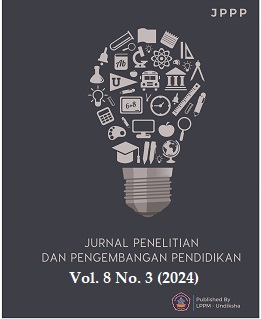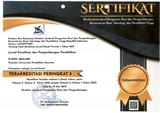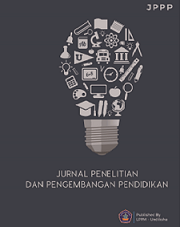Professional Flip-Pdf-Based Interactive Modules to Enhance The Creative Thinking Skills and Collaborative Skills of High School Students
DOI:
https://doi.org/10.23887/jppp.v8i3.76379Keywords:
E-Module, Flip Pdf Professional, Creative, CollaborativeAbstract
The ability of students to think creatively and collaboratively is not optimal because the learning atmosphere is not interactive and lacks variety in the use of learning media. This research aims to develop interactive e-module learning media based on flip-pdf-professional that can improve students' creative thinking skills and collaborative skills. The method used in research is research and development with a 4D development model (define, design, develop, and disseminate). Data were collected using observation, interview, questionnaire, and test methods. Descriptive, qualitative, and quantitative data analysis. The results showed that the flip-pdf-professional-based interactive E-module product is valid and very practical to use in biology learning in senior high school. The E-module product developed is quite effective in improving students' creative thinking skills and collaborative skills in biology learning. Research on the development of interactive e-modules based on flip-pdf-professional is more practical for teachers to use in learning and helps students with independent learning.
References
Annam, S., Makhrus, M., & Jamaluddin, J. (2023). E-Module by Flip PDF Professional Based on Problem Based Learning (PBL) Integrated Local Wisdom to improve students’ Problem Solving Ability. Journal of Science and Science Education, 4(2). https://doi.org/10.29303/jossed.v4i2.5217. DOI: https://doi.org/10.29303/jossed.v4i2.5217
Art R. Napoles, M. (2022). Development and Evaluation of E-Learning Module in 3D Homes Designing. Journal of Education and Teaching (JET), 3(2), 148–160. https://doi.org/10.51454/jet.v3i2.145. DOI: https://doi.org/10.51454/jet.v3i2.145
Bakti, I., Iriani*, R., Ihdayanti, A., & Hamid, A. (2023). E-Module Development Based on Flip PDF Professional by Using Problem Solving Model in Wetland Context to Improve Stoichiometry Learning Outcomes. Jurnal Pendidikan Sains Indonesia, 11(4), 740–754. https://doi.org/10.24815/jpsi.v11i4.31399. DOI: https://doi.org/10.24815/jpsi.v11i4.31399
Cynthia, C., Arafah, K., & Palloan, P. (2023). Development of Interactive Physics E-Module to Improve Critical Thinking Skills. Jurnal Penelitian Pendidikan IPA, 9(5), 3943–3952. https://doi.org/10.29303/jppipa.v9i5.2302. DOI: https://doi.org/10.29303/jppipa.v9i5.2302
Darling-Hammond, L., Flook, L., Cook-Harvey, C., Barron, B., & Osher, D. (2020). Implications for educational practice of the science of learning and development. Applied Developmental Science, 24(2), 97–140. https://doi.org/10.1080/10888691.2018.1537791. DOI: https://doi.org/10.1080/10888691.2018.1537791
Darmayasa, I. K., Jampel, N., Simamora, A. H., & Pendidikan, J. T. (2018). Pengembangan E-Modul Ipa Berorientasi Pendidikan Karakter di SMP Negeri 1 Singaraja. Jurnal Edutech Undiksha, 6(1), 53–65. https://doi.org/10.23887/jeu.v6i1.20267.
Daryono, D., Rayanto, Y. H., & Damayanti, A. M. (2023). Assessing Aspects and Items Validity, Practicality and Effectiveness on Students’ Final Project. EDUTEC : Journal of Education And Technology, 6(4), 684–703. https://doi.org/10.29062/edu.v6i4.657. DOI: https://doi.org/10.29062/edu.v6i4.657
Davidi, E. I. N., Sennen, E., & Supardi, K. (2021). Integrasi Pendekatan STEM (Science, Technology, Enggeenering and Mathematic) Untuk Peningkatan Keterampilan Berpikir Kritis Siswa Sekolah Dasar. Scholaria: Jurnal Pendidikan dan Kebudayaan, 11(1), 11–22. https://doi.org/10.24246/j.js.2021.v11.i1.p11-22. DOI: https://doi.org/10.24246/j.js.2021.v11.i1.p11-22
Delita, F., Berutu, N., & Nofrion. (2022). Online Learning: the Effects of Using E-Modules on Self-Efficacy, Motivation and Learning Outcomes. Turkish Online Journal of Distance Education, 23(4), 0–3. https://doi.org/10.17718/tojde.1182760. DOI: https://doi.org/10.17718/tojde.1182760
Dewi, Masril, M., Naf’an, E., Hendrik, B., Veri, J., Munawwaroh, K., Silfia, E., & Widyatama, A. (2019). The Development of E-Module English Specific Purpose based on Computer Application for Vocational High School Students. Journal of Physics: Conference Series, 1364(1). https://doi.org/10.1088/1742-6596/1364/1/012043. DOI: https://doi.org/10.1088/1742-6596/1364/1/012043
Fairuzi, O., & Bentri, A. (2021). Pengembangan E-Module Berbasis Aplikasi Flip PDF Corporate Edition pada Bimbingan TIK Kelas VII SMP. Inovtech, 3(2). https://doi.org/10.24036/inovtech.v3i02.211.
Faridy, F., & Rohendi, A. (2022). The Effect of Project-based Learning in Developing Naturalist Intelligence in Children. Journal International, 8(1), 12. https://doi.org/10.22373/equality.v8i1.11973. DOI: https://doi.org/10.22373/equality.v8i1.11973
Fauziah, S. I., Rahayu, Y. S., & Asri, M. T. (2023). International Journal of Social Science And Human Research The Validity E-modules of Riau Local Wisdom Based to Enhance Students ’ Creative Thinking through Research. 06(02), 1134–1142. https://doi.org/10.47191/ijsshr/v6-i2-47. DOI: https://doi.org/10.47191/ijsshr/v6-i2-47
Festiyed, F., Asrizal, A., & Desnita, D. (2023). Effect Of Stem Integrated Physics E-Modules To Improve Creative Thinking Ability. Pillar of Physics Education, 16(20), 155–161. https://doi.org/10.24036/14789171074.
Fikrina, Q. A., Sumarni, W., & Sumarti, S. (2023). Chemistry in Education Pengembangan E- Modul Kimia Larutan Terintegrasi Etno-STEAM Bahan Kajian Batik Pekalongan. Chemistry in education, 12(1), 17–24. https://doi.org/10.15294/chemined.v12i1.59507.
Haking, D., & Soepriyanto, Y. (2019). Pengembangan Media Video Pembelajaran Renang Pada Mata Pelajaran PJOK untuk Siswa Kelas V SD. JKTP: Jurnal Kajian Teknologi Pendidikan, 2(4), 320–328. https://doi.org/10.17977/um038v2i42019p320. DOI: https://doi.org/10.17977/um038v2i42019p320
Hermansyah, S., & Pammu, A. (2023). Socialization Making Media Learning Interactive E-Module based Flippbook in Elementary School 4 Maiwa. Pengabdian Jurnal Abdimas, 1(1), 1–7. https://doi.org/10.55849/abdimas.v1i1.117. DOI: https://doi.org/10.55849/abdimas.v1i1.117
Hidayat, W., Dewi, P., & Nurdiana, Y. (2021). Strengthening the Character Values in the Online Learning Process. Indonesian Journal of Islamic Education Studies (IJIES, 4(2), 150–164. https://doi.org/10.33367/ijies.v4i2.1933. DOI: https://doi.org/10.33367/ijies.v4i2.1933
Hobri, Adeliyanti, S., Fatekurrahman, M., Wijaya, H. T., Oktavianingtyas, E., Putri, I. W. S., & Ridlo, Z. R. (2021). E-Comic Mathematics Based on STEAM-CC and its Effect on Students Creative Thinking Ability. Journal of Physics: Conference Series, 1839(1). https://doi.org/10.1088/1742-6596/1839/1/012036. DOI: https://doi.org/10.1088/1742-6596/1839/1/012036
Khoiriyah, A. N., Subali, B., & Linuwih, S. (2022). Development of Interactive Learning Media to Foster the Creativity of Elementary School Students. Journal of Primary Education, 11(28), 345–358. https://doi.org/10.15294/jpe.v11i3.75299.
Kosassy, S. O. (2019). Mengulas Model-Model Pengembangan Pembelajaran dan Perangkat Pembelajaran. Jurnal Pelita Bangsa Pelestari Pancasila, 14(1), 152–173.
Kusumantoro, Jaenudin, A., & Sari Melati, I. (2022). Case-Based Interactive E-Module: an Alternative Supplement to Increase Student Learning Motivation. Journal of Education Technology, 6(4), 674–684. https://doi.org/10.23887/jet.v6i4.47254. DOI: https://doi.org/10.23887/jet.v6i4.47254
Lestari, A. C., & Annizar, A. M. (2020). Proses Berpikir Kritis Siswa dalam Menyelesaikan Masalah PISA Ditinjau dari Kemampuan Berpikir Komputasi. Jurnal Kiprah, 8(1), 46–55. https://doi.org/10.31629/kiprah.v8i1.2063. DOI: https://doi.org/10.31629/kiprah.v8i1.2063
Mulcahy, C. A., & Wertz, J. A. (2021). Using Project-Based Learning to Build College and Career Readiness Among Diverse Learners. TEACHING Exceptional Children, 53(5), 341–349. https://doi.org/10.1177/0040059920964833. DOI: https://doi.org/10.1177/0040059920964833
Niu, S. J., Niemi, H., Harju, V., & Pehkonen, L. (2021). Finnish student teachers’ perceptions of their development of 21st-century competencies. Journal of Education for Teaching, 47(5), 638–653. https://doi.org/10.1080/02607476.2021.1951602. DOI: https://doi.org/10.1080/02607476.2021.1951602
Nurhidayat, W., Surahman, E., & Sujarwanto, E. (2023). The Effect of Conceptual Understanding Procedures Learning Model on Students’ Higher Level Thinking Skills. JPI (Jurnal Pendidikan Indonesia), 12(2), 386–394. https://doi.org/10.23887/jpiundiksha.v12i2.58709. DOI: https://doi.org/10.23887/jpiundiksha.v12i2.58709
Nurmayasari, K. V., Pantiwati, Y., Wahyuni, S., Susetyarini, E. R., & Hindun, I. (2022). Studi Kemampuan Kolaborasi Siswa Dalam Pembuatan Herbarium Materi Klasifikasi Makhluk Hidup. Jurnal Education and Development, 10(2), 246–251. https://doi.org/10.37081/ed.v10i2.3667.
Pamungkas, S. F., Widiastuti, I., & Suharno. (2020). 21st century learning: Experiential learning to enhance critical thinking in vocational education. In Universal Journal of Educational Research (Vol 8, Number 4, bll 1345–1355). https://doi.org/10.13189/ujer.2020.080427. DOI: https://doi.org/10.13189/ujer.2020.080427
Parapat, W. S., & Sagala, P. N. (2022). Development of Interactive E-Modules Using Flip Pdf Professional Based on a Contextual Approach To Building Flat Side Space Materials. Indonesian Journal of Multidisciplinary Science, 1(8), 849–872. https://doi.org/10.55324/ijoms.v1i8.151. DOI: https://doi.org/10.55324/ijoms.v1i8.151
Pham, L., Kim, K., Walker, B., DeNardin, T., & Le, H. (2019). Development and validation of an instrument to measure student perceived e-learning service quality. International Journal of Enterprise Information Systems, 15(2), 15–42. https://doi.org/10.4018/IJEIS.2019040102. DOI: https://doi.org/10.4018/IJEIS.2019040102
Priantini, D. A. M. M. O., & Widiastuti, N. L. G. K. (2021). How Effective is Learning Style Material with E-modules During The COVID-19 Pandemic? Jurnal Ilmiah Sekolah Dasar, 5(2), 307–314. https://doi.org/10.23887/jisd.v5i2.37687. DOI: https://doi.org/10.23887/jisd.v5i2.37687
Pujiati, P., Rahmawati, F., Rahmawati, R., & Maydiantoro, A. (2022). Effectiveness of Using Hypercontent Based E-Module to Improve College Students’ Critical Thinking Skills. WSEAS TRANSACTIONS ON ADVANCES in ENGINEERING EDUCATION, 19, 80–86. https://doi.org/10.37394/232010.2022.19.9. DOI: https://doi.org/10.37394/232010.2022.19.9
Rahmatunisa, N., Sofyan, H., Daryono, R. W., & Nurtanto, M. (2022). Feasibility of Clinical Dietetics E-Module to Improve Learning Achievement of Vocational Students. Journal of Education Technology, 6(1). https://doi.org/10.23887/jet.v6i1.41542. DOI: https://doi.org/10.23887/jet.v6i1.41542
Roman, T. A. (2022). Review of Merging the Instructional Design Process with Learner-Centered Theory: The Holistic 4D Model by Charles M. Reigeluth and Yunjo An. TechTrends, 66(3), 560–562. https://doi.org/10.1007/s11528-022-00723-y. DOI: https://doi.org/10.1007/s11528-022-00723-y
Sabella, D., Ramadhani, E., & Kuswidyanarko, A. (2022). Pengembangan Media Kartu Domino pada Pembelajaran Matematika Materi Bangun Ruang. Jurnal Riset Pendidikan Dasar, 05(2), 132–140. https://doi.org/10.26618/jrpd.v5i2.7865.
Sakinah, G. S., Indrawadi, J., Suryanef, S., & Ernawati, E. (2023). The Development of E-Modules of Pancasila Education Learning with the Flipbook Application. Scaffolding: Jurnal Pendidikan Islam Dan Multikulturalisme, 5(3), 601–631. https://doi.org/10.37680/scaffolding.v5i3.3815. DOI: https://doi.org/10.37680/scaffolding.v5i3.3815
Salsabila, A. H., Iriani, T., & Sri Handoyo, S. (2023). Penerapan Model 4D Dalam Pengembangan Video Pembelajaran Pada Keterampilan Mengelola Kelas. Jurnal Pendidikan West Science, 1(08), 495–505. https://doi.org/10.58812/jpdws.v1i08.553. DOI: https://doi.org/10.58812/jpdws.v1i08.553
Scherer, R., Siddiq, F., & Tondeur, J. (2019). The technology acceptance model (TAM): A meta-analytic structural equation modeling approach to explaining teachers’ adoption of digital technology in education. Computers and Education, 128, 13–35. https://doi.org/10.1016/j.compedu.2018.09.009. DOI: https://doi.org/10.1016/j.compedu.2018.09.009
Shabiralyani, G., Hasan, K. S., Hamad, N., & Iqbal, N. (2015). Impact of Visual Aids in Enhancing the Learning Process Case Research : District Dera Ghazi Khan . 6(19), 226–234.
Sidiq, R., & Suhendro, P. (2021). Utilization of Interactive E-Modules in Formation of Students’s Independent Characters in the Era of Pandemic. International Journal of Educational Research and Social Sciences (IJERSC), 2(6), 1651–1657. https://doi.org/10.51601/ijersc.v2i6.194.
Sofyan, H., Anggereini, E., & Saadiah, J. (2019). Development of E-Modules Based on Local Wisdom in Central Learning Model at Kindergartens in Jambi City. European Journal of Educational Research, 8(4), 1137–1143. https://doi.org/10.12973/eu-jer.8.4.1137. DOI: https://doi.org/10.12973/eu-jer.8.4.1139
Sumarmi, Bachri, S., Irawan, L. Y., & Aliman, M. (2021). E-module in blended learning: Its impact on students’ disaster preparedness and innovation in developing learning media. International Journal of Instruction, 14(4). https://doi.org/10.29333/iji.2021.14412a. DOI: https://doi.org/10.29333/iji.2021.14412a
Supandee, W., & Yachulawetkunakorn, C. (2023). The Collaborative Learning of Science Project to Supporting 4C’s Skills for Learning in 21st Century. In S. J.-L., K. A., C. W., C. W., O. H., B. R., C. B., D. S., M. J., Y. A.M.F., Y. Y., & Z. H. (Reds), 31st International Conference on Computers in Education, ICCE 2023 - Proceedings (Vol 2, bll 555–560). Asia-Pacific Society for Computers in Education. DOI: https://doi.org/10.58459/icce.2023.1434
Susanto, S., Muafiah, E., Desrani, A., Ritonga, A. W., & Hakim, A. R. (2022). Trends of Educational Technology (EdTech): Students’ Perceptions of Technology to Improve the Quality of Islamic Higher Education in Indonesia. International Journal of Learning, Teaching and Educational Research, 21(6), 226–246. https://doi.org/10.26803/ijlter.21.6.14. DOI: https://doi.org/10.26803/ijlter.21.6.14
Toheri, Winarso, W., & Haqq, A. A. (2020). Where exactly for enhance critical and creative thinking: The use of problem posing or contextual learning. European Journal of Educational Research, 9(2), 877–887. https://doi.org/10.12973/eu-jer.9.2.877. DOI: https://doi.org/10.12973/eu-jer.9.2.877
Trimahesri, I., & Hardini, A. T. A. (2019). Peningkatan Kemampuan Berpikir Kritis dan Hasil Belajar Pada Mata Pelajaran Matematika Menggunakan Model Realistic Mathematics Education. Pendidikan Tambusai, 2(2), 621–631. https://doi.org/10.23887/tscj.v2i2.22272.
Triwoelandari, R., Handayani, E. W., & Arif, S. (2023). Development of Project-Based Learning Science E-Module To Improve Collaboration Skills of Elementary School Students. Jurnal Cakrawala Pendas, 9(4), 762–774. https://doi.org/10.31949/jcp.v9i4.6611. DOI: https://doi.org/10.31949/jcp.v9i4.6611
Triyono, B., Muhtadi, A., & Widowati, A. (2022). Mobile Application Smartphone: Does It Improve the 21st Century’s Competence of Vocational School Students? International Journal of Information and Education Technology, 12(12), 1286–1290. https://doi.org/10.18178/ijiet.2022.12.12.1752. DOI: https://doi.org/10.18178/ijiet.2022.12.12.1752
Umar, U., Purwanto, M. B., & Al Firdaus, M. M. (2023). Research and Development: As the Primary Alternative To Educational Research Design Frameworks. JELL (Journal of English Language and Literature) STIBA-IEC Jakarta, 8(01), 73–82. https://doi.org/10.37110/jell.v8i01.172. DOI: https://doi.org/10.37110/jell.v8i01.172
Wandani, S., Setyansah, R. K., & Masfingatin, T. (2023). Development of Mathematics e-Modules based on PjBL STEM on Materials Constructing Flat Side Spaces to Improve Mathematical Communication Ability of Junior High School Students. AL-ISHLAH: Jurnal Pendidikan, 15(1), 533–548. https://doi.org/10.35445/alishlah.v15i1.2497. DOI: https://doi.org/10.35445/alishlah.v15i1.2497
Wang, Y., Lavonen, J., & Tirri, K. (2018). Aims for learning 21st century competencies in national primary science curricula in China and Fin¬land. EURASIA Journal of Mathematics, Science and Technology Education, 14(6), 2081–2095. https://doi.org/10.29333/ejmste/86363. DOI: https://doi.org/10.29333/ejmste/86363
Widya, Maielfi, D., & Alfiyandri. (2021). Need Analysis for Physics E-Module Based on Creative Problem Solving Integrated 21st Century Skills. Journal of Physics: Conference Series, 1940(1). https://doi.org/10.1088/1742-6596/1940/1/012110. DOI: https://doi.org/10.1088/1742-6596/1940/1/012110
Yuberti, Latifah, S., Anugrah, A., Saregar, A., Misbah, & Jermsittiparsert, K. (2019). Approaching problem-solving skills of momentum and impulse phenomena using context and problem-based learning. European Journal of Educational Research, 8(4), 1217–1227. https://doi.org/10.12973/eu-jer.8.4.1217. DOI: https://doi.org/10.12973/eu-jer.8.4.1217
Zainudin, M., & Istiyono, E. (2019). Scientific approach to promote response fluency viewed from social intelligence: Is it effective? European Journal of Educational Research, 8(3), 801–808. https://doi.org/10.12973/eu-jer.8.3.801. DOI: https://doi.org/10.12973/eu-jer.8.3.801
Downloads
Published
How to Cite
Issue
Section
License
Copyright (c) 2024 Almira Rayyah Shadriah Fahru, I Nengah Kundera, Mursito S. Bialangi

This work is licensed under a Creative Commons Attribution-ShareAlike 4.0 International License.
Authors who publish with the Jurnal Penelitian dan Pengembangan Pendidikan agree to the following terms:
- Authors retain copyright and grant the journal the right of first publication with the work simultaneously licensed under a Creative Commons Attribution License (CC BY-SA 4.0) that allows others to share the work with an acknowledgment of the work's authorship and initial publication in this journal.
- Authors are able to enter into separate, additional contractual arrangements for the non-exclusive distribution of the journal's published version of the work (e.g., post it to an institutional repository or publish it in a book), with an acknowledgment of its initial publication in this journal.
- Authors are permitted and encouraged to post their work online (e.g., in institutional repositories or on their website) prior to and during the submission process, as it can lead to productive exchanges, as well as earlier and greater citation of published work. (See The Effect of Open Access)








